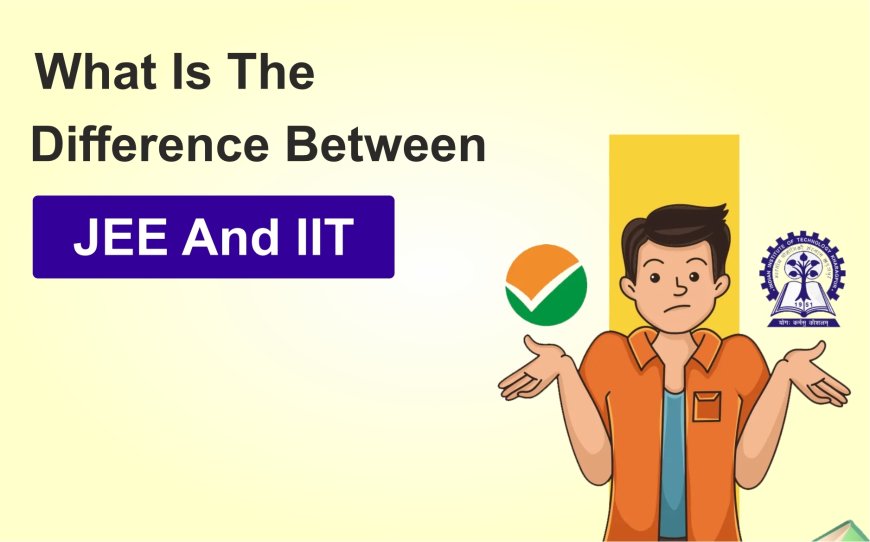What Is The Difference Between JEE And IIT?
Discover the fundamental distinctions between JEE vs IIT, including their roles, objectives, and connections in India's engineering school system.

What is the distinction between JEE and IIT when it comes to engineering and technology in India? While JEE and IIT are commonly referenced interchangeably, they pertain to different components of the procedure. The JEE (Joint Entrance Examination) Exam is a nationwide exam that allows students to get admission to famous engineering colleges such as the IITs. Although JEE is the test that selects which IITs are the top colleges for students to attend.
Many students who wish to work in technology or engineering sometimes question what the difference is between JEE and IIT. To address the misconception, this post will throw light on the distinctions between JEE and IIT and also provide information on the forthcoming JEE 2025.
What is JEE? Complete Overview
The Joint Entrance Examination (JEE) Exam is a nationwide entrance exam in India designed to examine candidates applying for undergraduate admission to engineering colleges. The examination is conducted in two stages: JEE Main and JEE Advanced are important tests for students who want to study at famous engineering colleges like NIT, IIITs, and IITs, among others. All around the country.
However, it is important to note that JEE Main and JEE Advanced are two separate tests. One is conducted jointly with the NTA (National Testing Agency), while the other is rotated among several IITs. The key components of JEE Main and JEE Advanced are described here.
What is the JEE Main Exam?
JEE Main is the first phase of the Joint Entrance Exam, which is held annually by the NTA to assess candidates who want to apply for engineering undergraduate programs at premier institutes such as IITs, NITs, and other federally supported technical colleges. The top 250,000 JEE Main applicants are entitled to take JEE Advanced, which is required for admission to IITs.
JEE Exam Main 2025 will be held during Session 1 from January 22 to January 31, 2025. The application window for Session 1 concluded on November 22, 2024. You can find the most crucial information here.
Read More: JEE Main 2025 Exam Season 2 : Syllabus, Exam Pattern & Mock Tests
JEE Main 2025 Key Updates:
- Mode of Exam: Online (Computer-Based Test)
- Subjects: Physics, Chemistry, Mathematics
- Question Types: MCQs and Numerical Value Answers (NAV)
- Total Questions: 90
- Duration 3 hours
- Subject-wise questions: Each subject includes 20 MCQs and 10 NAV questions.
- The marking scheme is +4 to indicate accurate answers and -1 if incorrect answers
- Total Marks: 300
- Languages: Assamese, Bengali, Marathi, Odia, Kannada, Malayalam, Punjabi, Tamil, Hindi, English, Telugu, Urdu, and Gujarati
What is the JEE Advanced Exam?
JEE Advanced is the last level of the Joint Entrance Exam, which is used to seek admission to India's 23 IITs. The test is offered by multiple IITs on a rotating basis. Only the top 2.5 lakh applicants who passed JEE Main are eligible to sit for JEE Advanced.
Furthermore, IIT Kanpur will hold the JEE Advanced 2025 test, which is scheduled to take place on May 20, 2025. To be eligible for the test, you must have passed or be currently taking their 10+2 exam and meet the requirements for the JEE Main Cut-Off. The main highlights of the exam are
JEE Advanced 2025 Key Updates:
- JEE Advanced 2025 Conducting Body: IIT Kanpur
- Exam Level: National
- Frequency: Once per year
- Mode of Exam: Online
- Number of Papers: Two
- Language/Medium: English and Hindi
- Colleges Accepting Scores: All IITs as well as other institutes
- Testing Cities: Number 232 (as as of 2025)
What Is IIT? An Overview
IITs, or Indian Institutes of Technology, are a prestigious set of autonomous engineering institutions in India that are known for their high academic standards and creative research. There are 23 IITs located across the country. The most prestigious institutes include IIT Madras, IIT Delhi, IIT Bombay, IIT Kanpur, and IIT Kharagpur.
IITs are categorized into two types: old IITs and new IITs. The former IITs included institutes such as IIT Bombay and IIT Delhi. IIT Delhi and the New IITs, which were founded in recent years, continue to maintain high-quality standards while providing world-class research and educational opportunities. Check out our list of the top IITs that are located in India as per the ranking of the NIRF in the following table:
What Is The Difference Between JEE and IIT?
The contrast between the two tests, JEE and IIT, is their functions in the engineering admission process. JEE is a nationwide entrance test that evaluates students for admission to various engineering institutes. It is divided into two phases: JEE Main and JEE Advanced. On the other hand, IITs are a set of premier engineering universities that attract students looking to study. To get admitted to an IIT, students must first pass JEE Main and then be eligible to take JEE Advanced. Simply said, JEE is the exam, while IITs are the top colleges that candidates hope to attend after passing the examination. To ensure that aspirants have a simple understanding, let's talk about IIT and JEE separately. Candidates can find out the differences in JEE and IIT as follows.
- IITs (Indian Institutes of Technology) are highly regarded engineering schools that provide undergraduate, postgraduate, and doctoral degree programs in technology and engineering. JEE serves as an admission test that is used to gain admission into these institutions as well as other engineering schools in India.
- IITs are institutions in which students can pursue their studies, and JEE is the test that allows students to be admitted to these schools.
- In order to be accepted into an IIT an applicant must be able to pass JEE Advanced, which is the second phase of the JEE examination. JEE Main is the first stage used to get admission into various engineering schools including IIITs and NITs.
- IITs are renowned for their excellent academic standards and worldwide reputation. JEE is a test for competitiveness that tests a candidate's understanding of Physics, chemistry, and mathematics.
- IITs offer engineering degrees and physics, while JEE is a qualifying test which candidates must pass to be able to take part in those courses.
Read More: CLC Sikar Full Review 2025: JEE Coaching, Hostel, Fees & Result
What Are the Top 10 IITs in India?
It's no surprise that the IITs count among the top engineering colleges in the world, recognized for their strict academics, cutting-edge research, and top-quality faculty. According to the most recent rankings, below are the IITs that are among the top 10 in India, well-known for their outstanding performance, rankings, and contribution to the field of science and technology.
- IIT Madras, established in 1959, has been ranked first by NIRF.
- IIT Delhi, founded in 1961, is in the 2nd spot within the NIRF ranking.
- IIT Bombay, set up in 1958, has been ranked third by NIRF.
- IIT Kanpur, established in 1959, is ranked as 4th on the NIRF list.
- IIT Kharagpur, the oldest IIT, established in 1951, is listed fifth by NIRF.
- IIT Roorkee, established in 1847, is ranked 6th by NIRF.
- IIT Guwahati, founded in 1994, is in 7th position within the NIRF ranking.
- IIT Hyderabad, established in 2008, has been ranked eighth by NIRF.
- IIT BHU (Varanasi) was established in 1919 and placed ninth by NIRF.
- IIT Indore, established in 2009, has been ranked as 10th in NIRF.
What Is The Difference Between IIT And JEE? IIT vs JEE Eligibility Criteria
Understanding the differences of IIT and JEE requires understanding the criteria for eligibility for both. This is a brief overview of the information:
- Eligibility requirements for JEE Main and JEE Advanced For the purpose of appearing in JEE Main, applicants must have passed or be appearing in their 10+2 exam. They must be within the age requirements as well as the amount of times they can attempt. Candidates who pass JEE Main are eligible to take JEE Advanced, which is the second part of the test.
- The eligibility criteria for admission to IITs: To be admitted to IITs applicants need to pass in both JEE Main as well as JEE Advanced. Additional requirements include age limitations as well as the number of attempts allowed, as well as the year that they took the 12th grade or equivalent exam.
Why is JEE Important for Admission to IIT?
JEE is essential for getting admittance to Indian Institutes of Technology (IITs) due to a variety of reasons.
- The primary entrance exam, JEE (JEE Advanced), is the principal entrance test for IITs. It is the sole way for students to be able to apply for these prestigious schools, making it an essential element in the admissions process.
- Merit-based Selection: IITs rely on JEE Advanced scores to assess the student's abilities in fundamental subjects like physics, chemistry, and mathematics. This ensures that only the top-quality students are selected.
- Unified Evaluation JEE offers a standard procedure for evaluating candidates from all over the world to ensure fairness in this selection procedure.
- Achieving well in JEE indicates that aspirants are prepared for the rigorous IIT curriculum as well as their ability to tackle more advanced studies.
In the end, the distinction between the two programs of JEE as well as IITs is significant but also clear. JEE has two phases--JEE Main and JEE Advanced, the way to the elite IITs. As JEE is the test that assesses the knowledge of applicants and the eligibility of applicants, IITs are the esteemed institutions that they wish to be a part of.
In addition, JEE Main being the first step and JEE Advanced being the final exam both play a crucial part in the admissions process. As students prepare to take JEE 2025, knowing the difference between them will help to navigate their way towards admission to an engineering college that ranks among India's best institutions.
What's Your Reaction?































